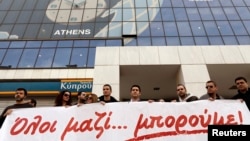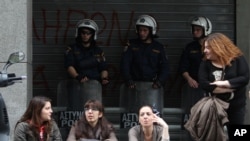Europe is pressuring Cyprus to offer new solutions to the island nation's debt crisis after its parliament overwhelmingly rejected a bailout plan sanctioned by the country's international lenders.
The European Commission, the administrative arm of the European Union, said Wednesday it was up to Cyprus to offer "an alternative scenario" after parliament balked at the $13 billion rescue plan that called for taxing the savings accounts of depositors at the country's banks.
German Chancellor Angela Merkel said she respected the Cyprus vote. But she said the Mediterranean nation's banking system - long viewed as a tax haven for wealthy offshore investors, especially Russians - is not financially stable for the long term. She said the banks should help fund the bailout.
"So we are of the opinion that the banking sector needs to make a contribution towards managing Cypriot debt and so we will continue negotiations, primarily via the [the group of international lenders]," she said. "We will look at any proposals Cyprus makes with respect. Germany wants a solution. Cyprus is a partner in the eurozone and therefore we are obliged to find a solution together.''
Cyprus pleaded for a new loan from Russia, but there was no immediate agreement.
Archbishop Chrysostomos said the Orthodox church is willing to mortgage its assets in Cyprus and invest in government bonds. He made the comment after a meeting with President Nicos Anastasiades.
The parliamentary vote Tuesday night left the fate of the bailout in question and raised the possibility that the Cypriot government could default on its financial obligations or even end its membership in the 17-nation euro currency union.
If it eventually secures a bailout, Cyprus is planning on using much of the money to refund its beleaguered banks that have been weighed down with losses on Greek government bonds that were reduced in value to help resolve the Athens debt crisis.
The original Cyprus debt terms were set by the International Monetary Fund, the European Central Bank and the country's eurozone neighbors. It called for the tiny country to impose what the lenders said was a one-time tax on bank deposits, nearly 10 percent on the largest accounts above $130,000.
The proposal drew the immediate ire of Cypriot depositors, as well as Russian President Vladimir Putin. Russian oligarchs have vast sums parked in Cypriot accounts. Cypriot banks have been closed this week and officials have yet to decide to whether to reopen them Thursday as they had announced.
The Cypriot economy accounts for only a very small fraction of the eurozone's economic fortunes, but none of the previous bailouts for Greece, Portugal, Ireland and the Spanish banking system has taxed savings. Some analysts said they feared that taxing deposits in Cyprus could set a precedent that might be followed in other debt-ridden countries in the currency bloc and ignite a run on banks to withdraw money.
Eurozone Bailouts
Countries that received Eurozone bailouts:- Spain, 2012: $129 billion
- Portugal, 2011: $100 billion
- Ireland, 2010: Ireland: $110 billion
- Greece, 2010 & 2012: $316 billion
German Chancellor Angela Merkel said she respected the Cyprus vote. But she said the Mediterranean nation's banking system - long viewed as a tax haven for wealthy offshore investors, especially Russians - is not financially stable for the long term. She said the banks should help fund the bailout.
"So we are of the opinion that the banking sector needs to make a contribution towards managing Cypriot debt and so we will continue negotiations, primarily via the [the group of international lenders]," she said. "We will look at any proposals Cyprus makes with respect. Germany wants a solution. Cyprus is a partner in the eurozone and therefore we are obliged to find a solution together.''
Cyprus pleaded for a new loan from Russia, but there was no immediate agreement.
Archbishop Chrysostomos said the Orthodox church is willing to mortgage its assets in Cyprus and invest in government bonds. He made the comment after a meeting with President Nicos Anastasiades.
The parliamentary vote Tuesday night left the fate of the bailout in question and raised the possibility that the Cypriot government could default on its financial obligations or even end its membership in the 17-nation euro currency union.
If it eventually secures a bailout, Cyprus is planning on using much of the money to refund its beleaguered banks that have been weighed down with losses on Greek government bonds that were reduced in value to help resolve the Athens debt crisis.
The original Cyprus debt terms were set by the International Monetary Fund, the European Central Bank and the country's eurozone neighbors. It called for the tiny country to impose what the lenders said was a one-time tax on bank deposits, nearly 10 percent on the largest accounts above $130,000.
The proposal drew the immediate ire of Cypriot depositors, as well as Russian President Vladimir Putin. Russian oligarchs have vast sums parked in Cypriot accounts. Cypriot banks have been closed this week and officials have yet to decide to whether to reopen them Thursday as they had announced.
The Cypriot economy accounts for only a very small fraction of the eurozone's economic fortunes, but none of the previous bailouts for Greece, Portugal, Ireland and the Spanish banking system has taxed savings. Some analysts said they feared that taxing deposits in Cyprus could set a precedent that might be followed in other debt-ridden countries in the currency bloc and ignite a run on banks to withdraw money.






